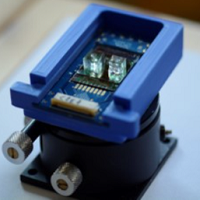For several years, teams from LERI (SPI/DMTS) and SPEC (IRAMIS) have been collaborating on the development of rapid, sensitive, portable, and low-cost early diagnostic devices for both primary care and emergency medicine. They previously demonstrated the proof of concept of a patented microfluidic biochip integrating a giant magnetoresistance (GMR) sensor. Positioned on either side of the microfluidic channel, the GMR sensor enables dynamic, single-cell detection in continuous flow of biological targets magnetically labeled with antibody-functionalized beads directed against the target of interest.
In this study, the researchers evaluated several of the criteria that define a point-of-care diagnostic test (the WHO-defined REASSURED criteria) using a non-pathogenic murine myeloma cell line pre-labeled with functionalized magnetic particles in a semi-complex matrix (culture medium). Under these conditions, the performance of the biochip proved highly satisfactory in terms of sensitivity and specificity of target cell detection, while also offering simple handling. The experiments also showed that the biochip retains its detection capabilities in a standard laboratory setting, marking an important step toward its use in point-of-care diagnostics.
Altogether, these evaluations indicate that the GMR biosensor chip is competitive with reference techniques such as ELISA tests or flow cytometry. In the long term, it could be used for the detection of other biological targets, with appropriate antibodies and microfluidic channel geometry.
REASSURED :
Real-time connectivity, Ease of specimen collection, Affordable, Sensitive, Specific, User-friendly, Rapid and robust, Equipment-free, and Deliverable.
Text derived from IRAMIS news.
Joliot contact : Cécile Féraudet-Tarisse (cecile.feraudet-tarisse@cea.fr)
Iramis contact : Guénaëlle Jasmin-Lebras (guenaelle.jasmin-lebras@cea.fr)

The
GMR-sensor biochip prototype has been awarded the '
POC in Labs 2023' call for projects from Université Paris-Saclay (DIAMSS project), which aims at
miniaturizing the prototype with the addition of a compact magnet and integrated electronics
in a portable case. In the long term, the biochip will be dedicated to
portable early diagnosis of sepsis within the framework of the IHU SEPSIS (the world's first research, training, and care center dedicated to sepsis), in which researchers from SPEC and SPI are involved. This is a fine illustration of the complementarity between research disciplines, here, magnetic sensor physics and medical biology, through the development of point-of-care tests.
GMR biochip © CEA-IRAMIS